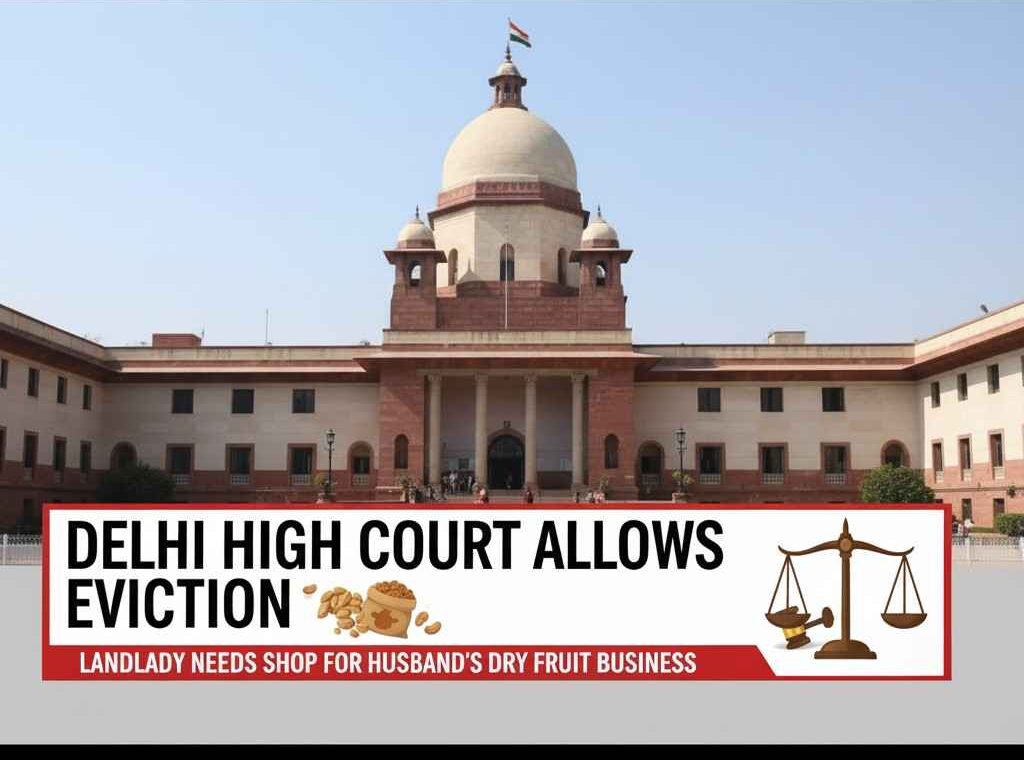Delhi High Court upholds eviction after ruling that a housewife landlady can reclaim her rented shop to help her unemployed husband start a dry fruit business. Detailed 600-word explanation of the judgment, legal reasoning, arguments, and implications under Section 14(1)(e) of the Delhi Rent Control Act.
Introduction
In a significant judgment delivered on October 16, 2025, the Delhi High Court reaffirmed the rights of landladies under the Delhi Rent Control Act by upholding the eviction of a tenant. Justice Saurabh Banerjee, in case RC.REV. 168/2023, ruled that a housewife landlady can legally seek possession of her rented property for the welfare and rehabilitation of her unemployed husband, who intends to start a dry fruits business. The Court emphasized that such a need falls squarely within the meaning of “own use” under Section 14(1)(e) of the Act.
Background of the Dispute
The case began when the landlady filed an eviction petition claiming that her husband, who had recently become unemployed, needed the rented premises to start a small dry fruits business. As the primary caretaker and the only person supporting him, she argued that reclaiming the shop was essential for the family’s financial stability. The tenant lost before the Tis Hazari Courts and subsequently appealed to the Delhi High Court.
Tenant’s Objections
The tenant raised several arguments to challenge the eviction order:
Availability of Alternative Properties
The tenant argued that the landlady had previously sold other properties and therefore had access to suitable alternative accommodations, making her need non-genuine.
Concealment in the Site Plan
It was claimed that the landlady concealed certain details in her site plan and failed to disclose other available premises.
Housewife Status of Landlady
The tenant argued that a housewife could not claim a bona fide need on behalf of her husband, especially when the husband was older than her and allegedly not dependent on her.
Sons Already Engaged in Business
The tenant pointed out that the couple’s younger son already ran a dry fruit business and the landlady failed to prove her husband’s unemployment or her own income status.
Landlady’s Counterarguments
The landlady’s lawyer, Mr. Arun Birbal, defended the eviction and argued that:
- The Tis Hazari Courts had thoroughly evaluated all objections.
- A housewife is fully entitled to support her spouse and exercise her legal rights as a landlady.
- The tenant failed to produce any evidence showing that the husband was employed or working elsewhere.
He maintained that the need was genuine and not a fabricated excuse to evict the tenant.
High Court’s Reasoning
Justice Banerjee dismissed the tenant’s contentions and held that the landlady’s requirement was honest, sincere, and legally valid. The Court observed:
“Own Use” Includes Needs of Spouse
Citing established legal principles, the Court held that a landlord or landlady can seek eviction for family members who are socially and legally dependent on them. The husband’s welfare was a legitimate ground.
Housewife Status Cannot Be a Disqualification
The Court stated that interpreting the law differently for a housewife would violate Articles 14 and 15 of the Constitution, which prohibit discrimination.
No Evidence from Tenant
The tenant failed to bring any documents proving that the husband was employed or that alternative premises were available. Mere allegations were insufficient.
Final Order
The tenant agreed to vacate the premises on or before May 30, 2026, and must clear all dues before handing possession. An affidavit of undertaking must be filed within two weeks, and the matter will be revisited on November 19, 2025.
FAQs
Can a housewife landlady seek eviction for her husband’s business?
Yes. The Court confirmed that a housewife has full legal rights to reclaim her property for her spouse’s welfare.
Does age or dependency affect eviction claims?
No. These factors do not limit the landlady’s legal right to seek possession.
What must a tenant prove to contest such an eviction?
The tenant must provide concrete evidence showing the landlord’s need is not genuine.

























